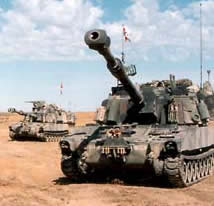
MINNEAPOLIS - United Defense Industries, Inc. demonstrated a cost-effective system to improve cannon artillery accuracy with the successful firing of inert M795 155-mm cannon projectiles equipped with a two-directional Course Correcting Fuze (CCF). United Defense has developed this new system with teammates Bofors Defence, Rockwell Collins and BT Fuze Products.
The CCF is a revolutionary, GPS-based innovation that dramatically improves the effectiveness of existing cannon artillery ammunition and provides near-precision accuracy that is critical in combat environments. It can be employed on all types of U.S. 155-mm and 105-mm projectiles in the U.S. Field Artillery inventory, and is ready for a fast track full scale development and early fielding.
United Defense successfully fired M795 rounds equipped with the CCF from a M109A6 Paladin to ranges of 14.5 kilometers at Yuma Proving Ground. Preliminary analysis from the demonstration confirmed United Defense's laboratory analysis and the projectiles equipped with the CCF achieved a precision error of less than 50 meters - three times more accurate than the control rounds.
"Urban conflict in Iraq has re-validated the need for accurate and responsive cannon fired artillery," said Jim Unterseher, director of Army Programs at United Defense. "This successful CCF demonstration proves an affordable solution for dramatically improving the accuracy of cannons has arrived and can be quickly fielded. With CCF, we're doing for cannon artillery what JDAM did for air delivered munitions - we're making existing iron projectiles 'smart'."
The CCF makes projectiles more accurate by integrating G-hardened, military GPS with proven flight control technology. Before a CCF-equipped round is fired, the target's GPS coordinates are programmed into the fuze. After the round is fired, the CCF guides the projectile to the target by deploying three different types of brakes (deployable fins) that adjust the projectile's range and deflection. During the projectile's flight, satellites communicate with the fuze to ensure the brakes deploy at the right time and continually adjust the projectile's trajectory to guide the round to its intended target.
United Defense's successful demonstration of the two-directional CCF prototype in a gun-fired environment is an industry first and it places the system at Technology Readiness Level 6.
"United Defense is pleased to be teamed with the premier munitions and fuze experts at Bofors Defence and BT Fuze Products, and munition GPS experts at Rockwell Collins to develop and produce the CCF," said Keith Howe, vice president and general manager, United Defense Armament Systems Division. "With more than five years already invested by this team in the CCF program, we are positioned to deliver this new capability to the Army in less than 12 months."
Building on the success of these latest CCF demonstrations, the United Defense-led team will continue to enhance its preliminary CCF design and research a broader range of applications for the technology.